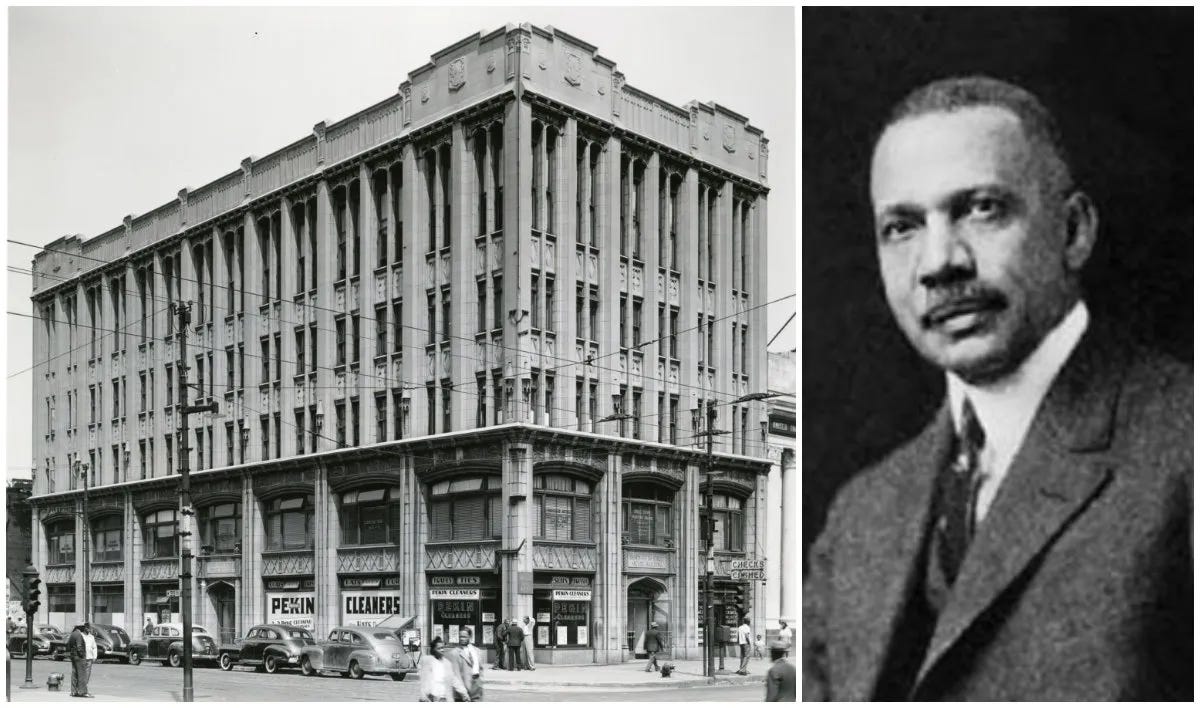The Man Who Brought Banking To Chicago’s South Side
Revisiting Jesse Binga’s Entrepreneurial Legacy
As a Chicagoan at heart, my adopted hometown, I am captured by all-things Windy City. But despite having lived in the metro area for over 12 years beginning back in the 90’s, I was only vaguely aware of the name Jesse Binga
Binga was Chicago’s first Black banker, real estate magnet, community leader, and millionaire. His ascension from poverty to become one of the wealthiest Black Americans in America in the late 19th century earned him national acclaim.
Born in Detroit in 1865, his dad, a native Canadian, was a barber and mom a property owner. Jesse dropped out of high school and later migrated to the state of Washington where in the City of Tacoma he followed in his father’s footsteps as a barber. Binga also became employed as a Pullman Porter and acquired property in Pocatello, Idaho which he sold at a healthy profit.
In 1893, Binga, now settled in Chicago, began pursuing a series of modest real estate ventures. Over the course of fifteen years, he had acquired sufficient wealth to launch a private bank.
On the heels of Chicago’s surge in population due in large part to the Great Migration, Binga opened Binga State Bank in 1908, fueled by initial deposits of over $200,000. In just a short three years, the bank had amassed deposits of over $1.3 million.
In 1912, he married Eudora Johnson in an elaborate ceremony that garnered vast media attention. A socialite, philanthropist and one of Chicago’s wealthiest and most fashionable Black women, Johnson brought additional financial assets along with a great deal of social prestige to the partnership as a result of money inherited from her brother John “Mushmouth” Johnson who died that same year.
In a landmark move, Binga unveiled a new $120.000 bank building in October of 1924 on Chicago’s South Side. Over time, he became a larger-than-life figure in Bronzeville and Chicago’s Black Belt.
A fiery evangelist for Black wealth, he often became the target of racist backlash. Undaunted, he persisted in sharing his message of uplift despite the unrelenting threats leveled his way.
While able to survive years of vitriol and attacks, the Great Depression had a chilling effect on his prosperous run. After the downturn led to the shuttering of his bank in 1930, Binga attempted to conceal some of his assets from bankruptcy proceedings, a move that led to a three-year prison sentence on embezzlement charges.
After being released, he retired as a janitor at Chicago's St. Anselm Catholic Church. Sadly, he passed away with barely enough money for a proper burial.
Despite his reputation having been somewhat tarnished in the latter stages of his life, Binga remains an iconic figure in the annals of Black banking.
In a book entitled “Binga: The Rise and Fall of Chicago’s First Black Banker” written by former Chicago Sun-Times Editor-in-Chief Don Hayner, Binga’s meteoric rise and precipitous fall is chronicled in exquisite detail.
Remarked Hayner in an interview I had with him upon completing the book:
“When I began researching Jesse Binga, I realized how much of an icon he was in the Black Belt of Chicago. What was particularly shocking to me was that his story had never really been told. So my natural curiosity then went from there.”
Adding to this, Hayner offered this assessment:
“I think Chicago was always the hub of Black Capitalism. I know there are other areas across the country that have a similar right to say that. But Chicago really had an entrepreneurial spirit and Binga was the epitome of that.
Hayner continues:
He was a self-made man. He was self-educated and had natural smarts. From what I learned he was great with numbers. He apparently could tabulate quickly and was often mentioned for that. He was a great negotiator, a hard negotiator.”
Hayner notes that at the time Binga was the most respected Black leader in Chicago, someone who was very outspoken and self directed.
Says Hayner:
“Jesse was always a kind of ‘do-for-self, ya gotta do things on your own’ type of guy. You’ve got to take control of your own shots. That’s what he always tried to do.”
Hayner offered this concluding thought:
“Obviously there are a lot more people in Black business circles who know about Binga than certainly in the White community. So in a way, I think this book is a message to the latter about Black entrepreneurs and the major obstacles they experience that white entrepreneurs don’t. I believe that this is a profoundly important message for our present times.”
A Song I Listened To While Writing This Article
Money Won’t Change You By Aretha Franklin
You Can Purchase This Book Here
Support us by purchasing “Binga: The Rise and Fall of Chicago’s First Black Banker” by Don Hayner from the “Great Books, Great Minds” bookstore. It will be delivered right to your doorstep and we get a small commision on all sales. Most importantly, you’ll be supporting independent bookstores nationwide amid their struggles to stay afloat given Amazon’s dominance.
An Invitation From Diamond-Michael Scott
“Great Books, Great Minds” is my full-time work and life passion, a labor of love fueled by the endless hours of work I put into researching and writing these feature pieces. So if you enjoy this digital newsletter, find it valuable, and savor world-class book experiences featuring epic authors and book evangelists, then please consider becoming a paid supporting member at $6.00 a month or $60.00/year.






This is a great story! Thank you! Sent on to Gary Hoover, creator and manager of the American Business History Center - https://americanbusinesshistory.org/about/
Fascinating story!